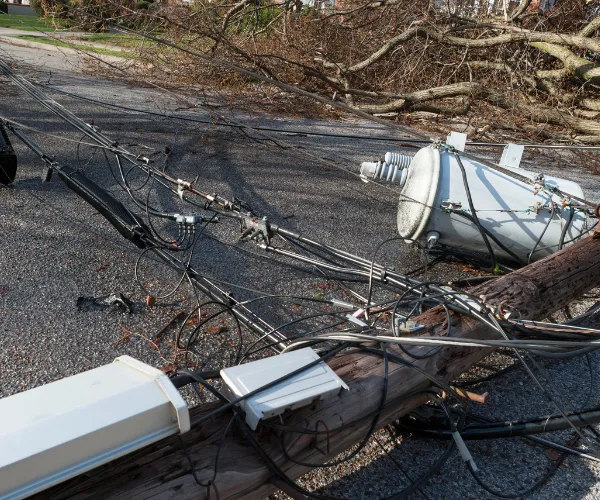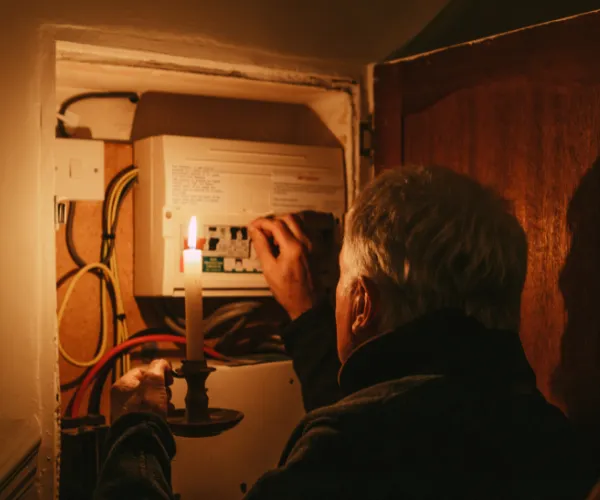What to Do When the Power is Out?
If you have experienced a power outage at home or in your business and don't have a backup generator you will know how frustrating and inconvenient this can be. Power outages don't occur often thankfully, due to the advances in our electrical infrastructure and the technology of our energy companies. However, if a power outage occurs the impact on our daily routines can be substantial and stressful
Being prepared and knowing what to do during a power outage can help you stay safe and comfortable until power is restored. There are steps you can take to help you navigate power outages safely and comfortably.

Causes of Power Outages
Power outages can be caused by various factors. In some instances such as maintenance by the electricity distributors, the community may be advised that their electricity supply will be interrupted. When the power is affected by storms there is generally no warning. Reasons include:
- Planned Maintenance - necessary maintenance or upgrades
- Weather-related causes - storms and high winds
- Accidents affecting power lines - vehicles colliding with utility poles and knocking out power lines
- Human error - Mistakes made during maintenance or construction
- Cybersecurity threats - Targeting power grids
- Equipment failure - Aging infrastructure and components

Steps to take the Power Goes Out:
It can be quite a shock when the power goes off unexpectedly, particularly in the evening. When this happens it typically indicates there is a problem with your electricity supply, causing loss of power to your lights, appliances and other electrical devices. In most instances you will not need to contact an electrician as the issue likely extends beyond your individual electrical system. Should your power go out:
- The first thing to do is remain calm and don't panic. Safety is paramount so ensure everyone in your home or workplace is safe and aware of the situation.
- If possible, try to determine the cause of the outage, it could be a localised issue, or a major outage affecting your neighbourhood. If you know the cause you can potentially estimate the duration of the outage.
- If the outage is limited to your home, check your breaker box or fuse box. A tripped breaker or blown fuse could be the culprit. Reset the breaker or replace the fuse if necessary.
- If the problem is widespread, contact your local utility company to report the outage. They can provide updates on the situation and estimated restoration times.
Safety Precautions During a Power Outage
Power outages as well as the inconvenience can pose safety risks, so having backup plans can make all the difference should the unexpected happen. Suggestions to help include:
- Only use flashlights or battery-powered lights for safety reasons, as candles can pose a fire risk.
- If downed power lines have caused the power outage stay well away from them. Contact your utility company immediately as this situation can be extremely dangerous.
- Protect your devices from power surges by unplugging sensitive electronics like computers, televisions, and gaming consoles.
- If you rely on electronic devices for communication, conserve battery life by reducing usage and dimming screens.
- To stay informed about the situation, if you have a battery-operated radio listen to for updates from your utility company and local authorities.

Preparing for Future Power Outages
Being prepared is key to minimising the impact of unexpected power outages and blackouts. Knowing you are well-prepared will make the situation less stressful and inconvenient, and help you until the power is restored.
- Emergency Kit - Prepare an emergency kit that includes essentials like flashlights, batteries, a first-aid kit, non-perishable food, bottled water, a battery-powered radio, and a portable charger for your devices.
- Backup Power Source - Consider investing in a generator or portable power station to keep essential appliances running during an extended outage.
- Plan for Food Safety - During a power outage, keep refrigerator and freezer doors closed to maintain food temperature. Discard any perishable food that has been at room temperature for more than two hours.
- Stay Connected - Ensure you have a way to communicate with family and friends during an outage. Keep a list of emergency contact numbers readily available.
- Know Your Local Resources - Familiarise yourself with local resources like warming centres in case of extreme weather conditions during a power outage.
- Emergency Numbers - Have a list of emergency numbers such as your energy distributor, electricity provider and emergency services on hand.
Other Considerations
Since the public is usually unaware of an impending power outage, it's important to think quickly and decide your next steps when it occurs. After addressing safety concerns and making essential preparations, here are a few general tips to keep in mind.
- Conserve Energy - Turn off unnecessary lights and appliances to conserve energy and prolong battery life.
- Stay Warm - Dress in layers and use blankets to stay warm during winter outages.
- Stay Cool - During summer outages, stay hydrated and find ways to keep cool, such as spending time in air-conditioned public places.
- Check on Neighbours - Check on elderly or vulnerable neighbours to ensure they are safe and have the resources they need.
1st Call Electrical can offer guidance if you have any questions or concerns regarding loss of power.
Resource: What To Do When The Power Goes Out | Canstar Blue<
